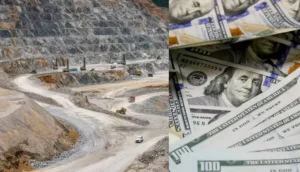Proceeds from oil and gas sales for Russia’s federal budget rose by around 41% year on year in the first half of the year 5.698 trillion roubles ($65.12 billion), finance ministry data showed on Wednesday, due to rising oil prices and the weaker rouble.
Oil and gas revenues have been the most important single source of cash for the Kremlin, accounting for around a third to a half of total federal budget proceedings for the last decade.
The military conflict in Ukraine has prompted the West to impose multiple sanctions aimed at curbing Russian oil and gas income that accounts for about a third of the country’s federal budget.
During the first half of the year, the price of Russian flagship oil Urals blend averaged at $69.1 per barrel, above the Western-imposed price cap of $60, up from 52.5$ in the same period 2023.
At the same time, the rouble rate weakened to 90.8 per $1 for the period from 76.9 in January – June 2023.
Oil and gas revenue was down from 794 billion roubles in May and comparing to Reuters forecast of 814 billion roubles.
Proceeds from the mineral extraction tax (MET) rose in June to more than 1 trillion roubles from 631.6 billion roubles in the same month of 2023, according to finance ministry.
The data also showed that payments to refineries under the “damping mechanism” – introduced to stop companies from capitalizing on high fuel export prices and defend the domestic market – reached 158.1 billion roubles last month, down from 201.7 billion roubles in May and 78.6 billion roubles in June 2023.
Russian President Vladimir Putin has hailed high rates of economic growth, saying they outstrip that of Western economies.
The economy grew 3.6% in 2023 after a revised 1.2% contraction in 2022. Russia-based economists have highlighted the poor quality of economic growth, saying that production of missiles and shells may contribute to higher GDP but offer limited benefit to the population.
For 2024 as a whole, the government budgeted for federal revenue of 10.7 trillion roubles from oil and gas sales, up 21% from 2023, when weaker oil prices and a fall in gas exports reduced the revenue by 24%.
Russia has heavily increased defence and security spending since launching what it calls a special military operation in Ukraine in February 2022, leading to two consecutive annual deficits exceeding 3 trillion roubles, about 2% of GDP.








